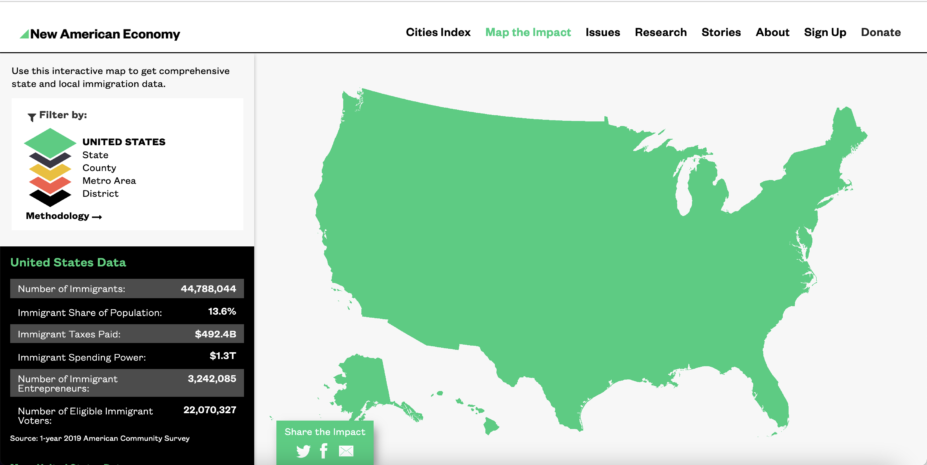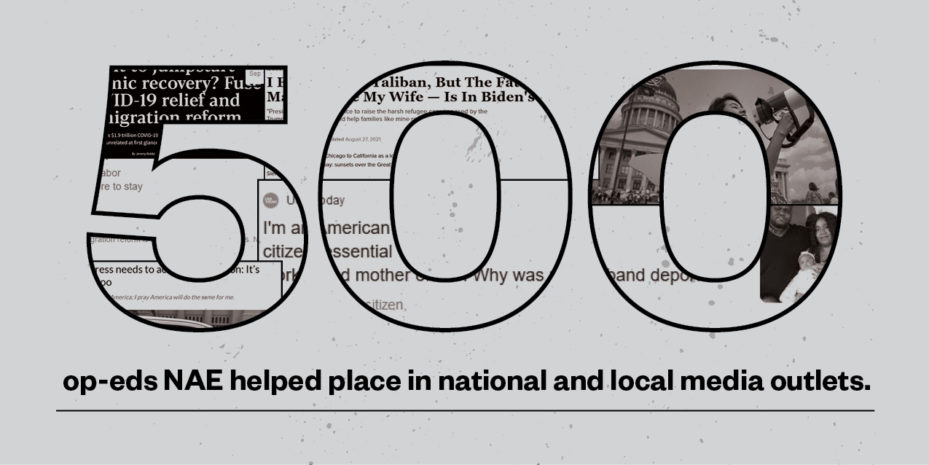2021 End of Year Report
Date: December 14, 2021
Dear Friends and Supporters,
This year’s end of year message is a particularly meaningful one for us: As of January 1st, New American Economy will officially merge with and become the American Immigration Council. We are so grateful for your partnership, support, and commitment to our work over the past decade — helping us to build a state and local arm with reach into more than 100 communities across the country, a research arm that produces world-class analysis to make the case for better immigration policies, a storytelling arm that celebrated helping everyday people place its 500 op-eds since the program’s inception, an arts and culture arm that uses comedy, food, music, and film to shift the way Americans think about immigration, and so much more.
We are thrilled to be able to take this work to the next level as we join forces with the Council, and we are so glad to have you with us for the next step of this journey. Our merger with the Council will give us a broad and unique set of advocacy tools to better expand and protect the rights of immigrants, more fully ensure immigrants’ ability to succeed economically, and help make the communities they settle in more welcoming. Together, we will be a unified organization that empowers newcomers from arrival to citizenship to full belonging. Learn more about the merger, and how you can be a part of the process, here.
As we near the end of another unprecedented year, we want to look back at all that we have accomplished together, and look forward to all that we hope to accomplish in 2022.
Rolling Back the Tide of Anti-Immigrant Policy, and Laying the Groundwork for Reform
This year, we saw a dramatic reversal of many of the most harmful anti-immigrant policies of the Trump administration, starting from the very first day that President Biden took office. Although there is still so much work to be done, we are proud of the victories we have achieved together this year — including the end of the Muslim travel ban and family separation at the border, the rebuilding of the U.S. refugee resettlement program, extended and expanded protections for Temporary Protected Status holders, the repeal of the Trump administration’s public charge rule, and the end of harmful worksite immigration raids, among other key policy shifts.

We also saw the power of our field’s collective advocacy materialize in the significant number of immigration bills introduced this year to create a path to citizenship for the undocumented, Dreamers, TPS holders, farm workers and other essential workers — including passage in the House of the American Dream and Promise Act and the Farm Workforce Modernization Act. Most recently, the House voted 220-213 to pass the Build Back Better Act, now in the Senate, which includes provisions to protect up to 7 million undocumented immigrants and reduce the backlog of employment- and family-based visas.
At each stage, NAE has mobilized our coalitions of civic and business leaders, storytelling program, and quantitative research team to build the case for these important efforts in the communities and states that matter most to the national debate:
- This year, we mobilized nearly 700 business and civic leaders across 8 crucial states in the fight for immigration reform, including Texas, Iowa, Utah, Florida, Colorado, Michigan, and Ohio, launching a new State Compact on Immigration in Maine that led to unprecedented business support for bills that reduce workforce barriers for skilled immigrants.
- NAE’s business coalitions in Ohio, Colorado, and Texas hosted meetings with five Senators and 16 Representatives to advocate for the Dream & Promise Act, Farm Workforce Modernization Act, and visa reform to keep their states competitive. This month, Ohio Business for Immigration Solutions celebrated its 1-year anniversary with an op-ed from former GOP Congressman and Ohio Chamber of Commerce President and CEO Steve Stivers in the Columbus Dispatch.

- We partnered with the Presidents’ Alliance on Higher Education and Immigration, a coalition of hundreds of college and university presidents, to launch the first comprehensive report looking to quantify the number and contributions of undocumented and DACA-eligible students in higher education. All told, NAE’s research team released 53 research publications, including 7 new data interactives and 12 full-length reports and white papers, in support of better, more inclusive immigration policies.
- Our Storytelling Team reached a new milestone this year, helping everyday people place over 500 op-eds in local and national newspapers since the program’s inception, including piece from the president of the Amegy Bank in the Houston Chronicle about immigrants’ role in solving the labor shortage, one from a long-time North Carolina farmer supporting the Farm Workforce Modernization Act in the Henderson Lightening, a piece about the role of Dreamers as essential workers in the Florida Sun Sentinel, and many more in local and national outlets across the country.

Welcoming Afghan Refugees
In August, as thousands of Afghan refugees began to arrive in the U.S., NAE acted quickly — pulling together key partners on the ground in communities that were preparing to accept large numbers of refugees, placing stories from business and military leaders calling on the U.S. to accept more refugees and calling on communities to step up to welcome them, and linking state leaders with federal officials to promote a more coordinated effort.

- In Utah, where NAE previously reaffirmed the Utah Compact on Immigration in 2019 and helped stand up the Salt Lake County Mayor’s Office for New Americans, we convened high-level stakeholders to connect resettlement agencies, state government, national philanthropy, and the private sector to coordinate support for Afghan arrivals.
- Through the Office of New Americans (ONA) State Network that NAE co-convenes with World Education Services Global Talent Bridge, which now includes members representing 13 Democrat and Republican-led states, we facilitated exclusive briefings with high-level federal officials from USCIS, Department of Homeland Security, and Office of Refugee Resettlement for our state government partners. ONA State Network members also participated in briefings with the White House and Department of Health and Human Services.
- Since September, NAE has hosted weekly calls with the ONA State Network, along with select state refugee coordinators, to plan for resettlement of Afghan evacuees. The group has had regular contact with the Departments of Homeland Security, State and USCIS, along with non-governmental partners like Welcome.us and Every Campus a Refuge.

- And we’ve continued to work with leaders across the country to help make the case for why we can and should welcome Afghan refugees, placing op-eds from key voices in outlets like the Dallas Morning News, Austin American-Statesman, Richmond Times-Dispatch, Georgia Recorder, and the Military Times.
Helping Communities Navigate an Inclusive COVID-19 Response and Recovery
As communities across the country continue to grapple with COVID-19 and work to bounce back from the economic recession it caused, we know that the pandemic’s impact has been uneven, and that immigrants and communities of color face a more difficult road to recovery. To better understand how COVID-19 impacted people of color and immigrant residents living in U.S. cities, and to arm local officials with data and strategies for promoting an inclusive recovery, we conducted groundbreaking new research and expanded our technical assistance and support for communities.
- In August, we released the findings of a five-city, 2,100-person survey conducted in partnership with the cities of Atlanta, Austin, Denver, Louisville, and Tulsa, which shed new light on the ways in which immigrants and communities of color were impacted by COVID-19, the barriers they experienced in accessing services, and the successful, city-led efforts to promote inclusive emergency management and recovery. The report, Understanding the Impact of COVID-19 on Diverse Populations: Insights and Strategies for Inclusive Emergency Management from Cities on the Frontlines, was funded by the Walmart Foundation and contains survey data from all five cities as well as best practices pulled from dozens of cities across the country.

- In October, we launched the fourth year of the NAE Cities Index, with Chicago taking the top spot for immigrant integration policies and outcomes among the 100 largest cities in the United States. To capture the responses and adaptations of U.S. cities in response to the COVID-19 pandemic, this year’s Index featured a new section with seven additional metrics on Inclusive Emergency Management, including practices like providing financial support to excluded immigrant workers, employing multilingual representatives to conduct outreach to immigrant communities during emergencies, and providing targeted relief to immigrant-owned small businesses.
- In partnership with Welcoming America, we also launched the fourth cohort of Gateways for Growth, with 10 communities receiving customized research reports and 9 communities receiving technical assistance in support of the creation of a strategic immigrant integration plan. So far, we’ve partnered with 12 communities to release new research reports — including Columbus, Minneapolis, Erie, Mercer County, Spokane County, Contra Costa County, Miami-Dade County, St. Paul, San Mateo County, Washoe County, Ottawa County, Gainesville — with 6 more scheduled to be released by January 2022.
And at the state level…
- NAE supported the creation this year of four new statewide Offices for New Americans, in Colorado, Maryland, Oregon, and Illinois, through research, testimony, and technical assistance. These offices will work across state agencies to promote the inclusion of immigrants and refugees and ensure their recovery from COVID-19.
- Over the course of the year, as new variants emerged and new federal government resources and opportunities materialized, we facilitated regular peer-learning calls and webinars on state and local responses to the COVID-19 pandemic, including on contact tracing and testing, vaccine messaging and distribution, and using American Rescue Plan Act funds to address immigrant inclusion. NAE’s American Rescue Plan webinar in June 2021 was attended by more than 160 participants from 36 states and 87 communities.
- This year, the ONA State Network also launched a language access series for members to learn about best practices from state and local governments who are leaders in the field. Featured speakers have included the New York State Office of New Americans, the City of Seattle, and the Migration Policy Institute. The series will continue into 2022.
Powering Narrative Change with Data, Stories, and Immersive Experiences
This year, NAE broke new ground in our effort to shape the narrative on immigration and inform policymakers, the media, and the public about the impact of immigration — as well as the challenges currently facing the U.S. as a result of declining immigration over the past several years.
- In 2021, NAE released 53 research publications, including seven new data interactives and 12 full-length reportsand white papers. We also updated our signature data tool, Map the Impact, to provide users with data on immigrants and their role in the economy across the United States, at the state, metro, and county level.

- We used our data to lift up the issues, stories, and contributions of diverse communities across the country. In September, as part of Hispanic Heritage Month, we partnered with UNIDOS, the nation’s largest Latino civil rights and advocacy organization, to highlight the myriad contributions of Hispanics to our society and economy with the report, The Economic Contributions of Hispanic Americans. And earlier this year, we partnered with the Leaders Forum, which provides leading analysis of Asian American demographics and related public policy issues, to commemorate Asian American and Pacific Islander Heritage Month with a series of reports that took a closer look at the U.S.’ AAPI population, both in terms of their many contributions and achievements but also at what socioeconomic challenges remain for many in the community.
- And to push back on the narrative that immigrants are a drag on the social safety net, NAE released two reports that looked at how immigrants contribute more to both private non-marketplace health insurance and to Medicare than is spent on their behalf. The reports were covered in detail by Yahoo! Finance.

- In July, NAE’s Storytelling Team reached an incredible new milestone: helping everyday people place 500 op-eds in national and local media outlets across the country. With your support over the past several years, we have lifted up the voices of Dreamers, essential workers, farmers, business leaders, mayors, and more in nearly every major media market in the country. In just the second half of this year, we helped place op-eds in nearly 75 media outlets.
- And we’re continuing to reach important new outlets and communities: In 2021, we broke into 23 new local publications, including the Chatham News & Record in North Carolina, the Williston Herald in North Dakota, the Northern Kentucky Tribune and the Sandusky Register in Ohio.
- We’re also helping to strengthen local journalism with the perspectives of immigrants: After we helped an asylum seeker in Lewiston, ME place an op-ed in the Sun Journal, the editor asked our source to pitch him an idea for a monthly column. We helped him develop this and are now working with him every month to craft an op-ed about the positive impact of immigrants in the city. Read Heritier’s latest column in the Lewiston Sun Journal.
NAE also continues to invest in Arts & Culture, launching three new programs just this past year:
- This year, New American Economy in partnership with Brooklyn Arts Council, launched the New American Fellows pilot program — an artist fellowship founded on the principles of community, research and narrative change. NAF will award six individual immigrant and refugee artists a grant for an original art project in any medium. The art must be inspired by research from New American Economy’s Map the Impact data interactive. NAF is open to all immigrant and refugee New York City artists, with diversity as a key factor in the selection process. The culmination will be a public presentation of the work in the fall of 2022.
- Earlier this year, NAE’s Arts & Culture arm also launched The Film Club, a monthly virtual film series focused on immigrant filmmakers and subject matters related to the immigrant experience in America, and The Lit Club, in partnership with Fable, which is a book club and living resource focused on literary works shedding light on the immigrant experience in its many forms. Through partnerships with Neon, PBS’ Indie Lens, A24, and others, NAE is able to bring incredible, immigrant-focused films and stories to new audiences.
Thank you for being part of the journey
Despite all of the important progress made this year, we know that there is hard work left to be done, and we will need to mount even greater pressure on the administration and Congress to undo the damage of the Trump administration and meaningfully reform America’s long outdated, inhumane, and ineffective immigration system. As we look toward the 2022 midterms, we also know that there will be new challenges in the coming year.

We will need to hold the federal government accountable, while also fighting to expand and protect the rights of immigrants in Congress and in state houses and local governments across the country. Our merger with the American Immigration Council could therefore not come at a more important time. We are excited to combine the legal and litigation work, federal policy expertise, and innovative work on belonging from the Council with the research, state and local policy work, and arts and culture programming from NAE — to work collectively toward building a stronger America for all of us.
A note from the Council’s new Executive Director – and former NAE Executive Director – Jeremy Robbins: “It’s rare that nonprofits merge, but it shouldn’t be. Together these two organizations can reach more audiences with more powerful tools than either could ever do apart, at a scale that is unparalleled. We’ll better ensure that immigrants can succeed and thrive, more fully support the communities that welcome them, and more powerfully fight for reform at the local, state, and federal level. I believe our field needs to evolve and that it’s time to reimagine our work in a way that helps us best serve newcomers while rebuilding a bipartisan and constructive case for what immigration means for America.”
We cannot do this work alone. As we look to 2022 and the fight ahead, we hope you’ll continue on this journey with us every step of the way.
Here’s to a healthy, safe, and happy new year,
The Team at New American Economy


